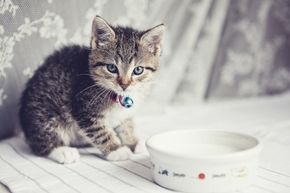Quck answer
While many people associate giving cats milk with a loving and caring gesture, it’s actually not the best idea. Most cats are lactose intolerant, meaning they lack the necessary enzymes to digest lactose, the main sugar found in milk. Drinking milk can cause digestive upset, including diarrhea, vomiting, and abdominal pain. Additionally, milk lacks essential nutrients that cats need, such as taurine, which is important for heart and eye health. Instead of milk, cats should stick to water and a well-balanced diet specifically formulated for their nutritional needs.
Pets

The image of cats enjoying a bowl of milk is a common one, but milk can actually cause digestive problems for them and is not very nutritious. Cats, like many mammals, are lactose intolerant, meaning that they lack the enzymes necessary to break down the lactose in milk. While milk is not toxic to cats, it can cause diarrhea, gas, bloating, and other unpleasant side effects. If your cat can tolerate milk, it should be treated like any other treat and only make up 10-15% of their diet. Milk has little nutritional value for cats and can lead to weight gain if given in excess. For kittens, cow’s milk is not recommended as it can cause diarrhea and malnutrition. Special cat’s milk can be found at pet stores and provides the necessary nutrients for growing kittens without causing digestive issues.
Additional Information
Related Articles
- The Functioning of Cats
- 10 Recommendations for Families With Cats
- Understanding Lactose Intolerance
- How to Care for a Cat with Diarrhea
- At-Home Remedies for Overweight Cats
Sources
- Cornell University College of Veterinary Medicine. “Feeding Your Cat.” Date Unknown. (Oct. 15 2014). http://www.vet.cornell.edu/FHC/health_resources/FeedYourCat.cfm
- Fries, Wendy C. “Cats and Dairy: Get the Facts.” WebMD. Date Unknown. (Oct. 15, 2014) http://pets.webmd.com/cats/guide/cats-and-dairy-get-the-facts?page=2
- Kitten Rescue. “Kitten Care Handbook.” Date Unknown. (Oct. 15, 2014) http://www.kittenrescue.org/index.php/cat-care/kitten-care-handbook/
- Wortinger, Ann. “Nutrition for Veterinary Technicians and Nurses.” John Wiley and Sons. 2013.
- Zelevansky, Nora. “What’s the Deal With…Cats and Milk?” VetStreet. Sept. 10, 2012. (Oct. 15, 2014). http://www.vetstreet.com/our-pet-experts/whats-the-deal-with-cats-and-milk
FAQ
1. Can cats drink milk?
Yes, cats can drink milk, but it is not recommended. Contrary to popular belief, most cats are lactose intolerant, meaning they lack the enzyme needed to digest lactose, the sugar found in milk. Consuming milk can cause digestive issues such as diarrhea, vomiting, and abdominal pain. It is best to stick to giving cats water and specially formulated cat milk.
2. What kind of milk can cats drink?
Cats can drink specially formulated cat milk that is lactose-free. This type of milk is made with a blend of water, milk proteins, and fats that are easily digestible for cats. It is important to note that even though cat milk is lactose-free, it should still be given in moderation as too much can cause digestive issues.
3. Can kittens drink milk?
Yes, kittens need milk for their growth and development. However, it is important to provide them with their mother’s milk or a specially formulated kitten milk replacement. Cow’s milk should not be given to kittens as it can cause digestive issues and does not provide the necessary nutrients for their growth.
4. What are the alternatives to milk for cats?
Water should always be the primary source of hydration for cats. If you want to give your cat a treat, you can offer them small amounts of cat-friendly human foods such as cooked chicken, fish, or vegetables. You can also purchase specially formulated cat treats and wet food that provide additional hydration and nutrients.
5. What should I do if my cat drinks milk?
If your cat accidentally drinks milk, monitor them for any signs of digestive issues such as diarrhea, vomiting, or abdominal pain. If symptoms occur, contact your veterinarian for advice on how to manage your cat’s discomfort. It is also important to remember to keep milk and other dairy products out of reach of your cat to prevent accidental ingestion.





Leave a Reply